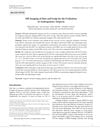 19 citations,
February 2018 in “Nutrients”
19 citations,
February 2018 in “Nutrients” Certain zinc transporters are essential for healthy skin and managing zinc in the body could help treat skin problems.
 4 citations,
April 2011 in “International Journal of Radiation Biology”
4 citations,
April 2011 in “International Journal of Radiation Biology” Radiation significantly slows down wound healing in mice.
 40 citations,
March 2022 in “Small”
40 citations,
March 2022 in “Small” Hydrogel with M2-derived exosomes improves wound healing by slowly releasing exosomes that help reduce inflammation and promote tissue repair.
 1 citations,
January 2005 in “Side effects of drugs annual”
1 citations,
January 2005 in “Side effects of drugs annual” The document concluded that various dermatological treatments have different effectiveness and side effects, with some causing irritation, allergic reactions, or systemic effects.
 74 citations,
June 2018 in “Cell death and disease”
74 citations,
June 2018 in “Cell death and disease” Restoring mitochondrial function in mice reversed their skin wrinkling and hair loss.
 41 citations,
March 2007 in “Journal of dermatological science”
41 citations,
March 2007 in “Journal of dermatological science” Taking L-cystine and vitamin B6 can prevent hair loss caused by smoke in mice.
 57 citations,
September 2017 in “Journal of controlled release”
57 citations,
September 2017 in “Journal of controlled release” Nanocarrier-loaded gels improve drug delivery for cancer, skin conditions, and hair loss.
 77 citations,
July 2020 in “Cell”
77 citations,
July 2020 in “Cell” Muscles and nerves that cause goosebumps also help control hair growth.
 3 citations,
February 2023 in “ACS omega”
3 citations,
February 2023 in “ACS omega” Grape seed oil improved hair quality the most, followed by rosehip and safflower seed oils, and reduced damage from shampoo.
75 citations,
February 2017 in “Aging” SkQ1 antioxidant improved health and lifespan in mice.
36 citations,
March 2014 in “Molecular and Cellular Biology” Cidea is essential for proper lipid storage and secretion in sebaceous glands, affecting skin and hair health.
9 citations,
July 2022 in “Journal of Biological Chemistry” WWP2 is crucial for tooth development in mice.
 1 citations,
August 2000 in “Expert Opinion on Therapeutic Patents”
1 citations,
August 2000 in “Expert Opinion on Therapeutic Patents” Boosting mitochondrial energy production with supplements like acetyl-L-carnitine may improve aging-related cellular function and health conditions.
 12 citations,
May 2005 in “Current obstetrics and gynaecology/Current obstetrics & gynaecology”
12 citations,
May 2005 in “Current obstetrics and gynaecology/Current obstetrics & gynaecology” Hirsutism is too much hair growth in women like the pattern in men, often caused by high male hormones, and can be treated with hormone control and hair removal methods.
 4 citations,
April 2001 in “European journal of cancer”
4 citations,
April 2001 in “European journal of cancer” Scalp cooling prevented hair loss in half of the patients, despite significant side effects.
 9 citations,
January 2015 in “Current problems in dermatology”
9 citations,
January 2015 in “Current problems in dermatology” Scientists have found specific genes linked to different hair loss conditions, which could lead to new treatments.
 December 2020 in “bioRxiv (Cold Spring Harbor Laboratory)”
December 2020 in “bioRxiv (Cold Spring Harbor Laboratory)” Stress can cause a type of hair loss in mice lacking the CCHCR1 gene.
 26 citations,
January 1994 in “Clinics in Dermatology”
26 citations,
January 1994 in “Clinics in Dermatology” Artificial skin is improving wound healing and shows potential for treating different types of wounds.
 11 citations,
April 2013 in “SpringerPlus”
11 citations,
April 2013 in “SpringerPlus” Human skin's melanocytes respond to light by changing shape, producing pigments and hormones, which may affect sleep patterns.
 1 citations,
April 2020 in “Magnetic Resonance in Medical Sciences”
1 citations,
April 2020 in “Magnetic Resonance in Medical Sciences” MRI helps evaluate androgenetic alopecia severity.
 60 citations,
January 1989 in “Toxicologic Pathology”
60 citations,
January 1989 in “Toxicologic Pathology” Using minoxidil on dogs can cause serious cardiovascular damage, including arterial injury and hemorrhagic lesions.
 40 citations,
July 1995 in “Toxicologic Pathology”
40 citations,
July 1995 in “Toxicologic Pathology” Minoxidil can harm dog's heart.
 9 citations,
October 2011 in “Journal of proteomics”
9 citations,
October 2011 in “Journal of proteomics” Taxol damages hair growth cells, causing hair loss.
 4 citations,
December 2020 in “Mammalian genome”
4 citations,
December 2020 in “Mammalian genome” Harlequin mutant mice have hair loss due to low AIF protein levels and retroviral element activity.
 1 citations,
May 2017 in “InTech eBooks”
1 citations,
May 2017 in “InTech eBooks” Some natural remedies may help with hair regrowth, but more research is needed to confirm their effectiveness and safety.
96 citations,
April 2017 in “Oncotarget” Smaller nanoemulsions can penetrate skin and hair follicles better, which may be useful for delivering drugs and vaccines through the skin.
5 citations,
August 2021 in “Journal of biological chemistry/The Journal of biological chemistry” Retinoic acid affects male and female muscle energy use and function differently.
15 citations,
November 2018 in “Current radiopharmaceuticals” Melatonin can help prevent and treat skin damage caused by gamma rays.
5 citations,
March 2013 in “BMJ case reports” Gastric bypass surgery improved a woman's hormonal disorder without the need for medication.
15 citations,
June 2020 in “The journal of investigative dermatology/Journal of investigative dermatology” Mice with extra human KLK14 had hair and skin problems, including weaker cell bonds and inflammation, linked to Netherton syndrome.






















